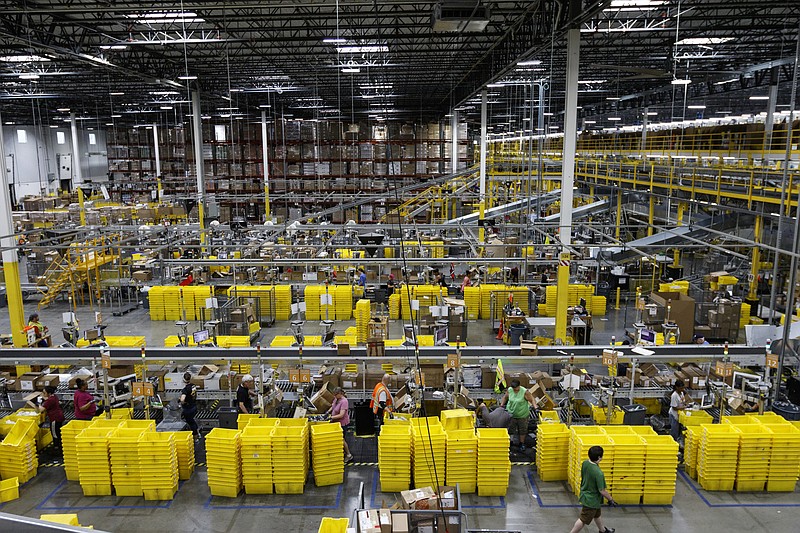What was most remarkable about last week's announcement that three United States business giants would form an independent health care company was what was not said.
Missing from the announcement was any indication that while Amazon, Berkshire Hathaway and JPMorgan Chase feel obligated to move forward with their own plan, they believe in their corporate heart of hearts that government is better positioned to provide health care coverage.
No, instead of using the words "Obamacare," "Affordable Care Act," "universal health care" or "federal government," they simply said in their announcement they want to focus on technology to provide simplified, high-quality health care for their employees and families, and at a reasonable cost.
Their plan would, the companies noted, be "free from profit-making incentives and constraints" and one day could be expanded to benefit all Americans.
Make no mistake, though. All three companies have been intimately linked to left-wing politics, the purveyors of which much prefer federal government control over the nation's health care system.
After all, Amazon's chief executive officer, Jeff Bezos, owns The Washington Post, which did its dead level best to elect Democrat Hillary Clinton president in 2016 and has tried to gin up reasons to get rid of Republican President Donald Trump ever since. Berkshire Hathaway CEO Warren Buffett endorsed Clinton, campaigned for her and gave her the most money he's ever given a candidate. And JPMorgan Chase was the fourth biggest corporate donor in the S&P 500 to Clinton's campaign.
But Tuesday's announcement indicated the businesses hoped to craft a health care plan without the grasping tentacles of government and without too much influence from insurance companies.
That got the attention of the Trump administration and other major health care players.
"We're doing the same thing here at the White House," Trump adviser Gary Cohn told CNBC, while pointing to a new administration policy that expands small business offerings outside of the Affordable Care Act marketplace.
Meanwhile, health care-related companies shuddered at the thought of the potential competition from the companies that currently employ 1 million people. As evidence, the stock prices of several companies fell 5 to 10 percent before recovering slightly.
But the three just want the same things consumers want - the ability to shop for a health care plan that fits them (as they might for a dress on Amazon), health care costs that don't rise faster than their salaries and a delivery system that beats what we have today.
Today, the average American annually spends nearly $4,000 toward health care, according to Evercore ISI and the Centers for Medicare and Medicaid. That amount is expected to top $5,000 in 2023.
Health insurance premiums went up 19 percent between 2012 and 2017, and wages only 12 percent, according to the Kaiser Family Foundation. Between 2007 and 2012, premiums increased twice as fast as employee pay.
And the health share of gross domestic product in the U.S. is anticipated to grow from 17.8 percent in 2015 to 19.9 percent by 2025.
"The ballooning costs of health care act as a hungry tapeworm on the American economy," Buffett said in a statement. "Our group does not come to this problem with answers. But we also do not accept it as inevitable."
Many claim the health care system prior to the Affordable Care Act (ACA) wasn't working for enough people in the country, and most people know by now the ACA didn't deliver as it was promised and as inexpensively as it was vowed it would.
So can three gigantic businesses - businesses at the top of their game, granted - do better with a $3.3 trillion health industry? Certainly, Amazon knows technology and delivery systems. The three recognize the combined buying power of 1 million workers. Buffett has pointed out health-care costs are a bigger impediment to American competitiveness than taxes. And they all know lowering health-care costs of employees lowers the cost of business.
The announcement provided few details, and persons familiar with the tentative plans said the businesses aren't forming a health insurance company, a pharmaceutical company or a hospital. And other smaller companies have tried before to unite to improve the health care purchase power for employees.
But one could imagine the success of such a plan would attract other businesses to want to join the consortium and would raise demands by the approximately 156 million American consumers stuck with employer insurance plans that cover less and cost more every year.
"The health care system is absolutely ripe for disruption," Robert Wachter, chairman of the medicine department at the University of California, San Francisco, told Politico. "Nobody's figured out how to do it yet."
Generally, we believe private businesses are better able to tackle big-ticket items like health-care coverage better than governments. We know this particular effort won't be quick, and it won't be perfect. But we believe there's a better consumer model out there than the mishmash of the private and public system we have now. We're glad these titans are willing to take it on.
